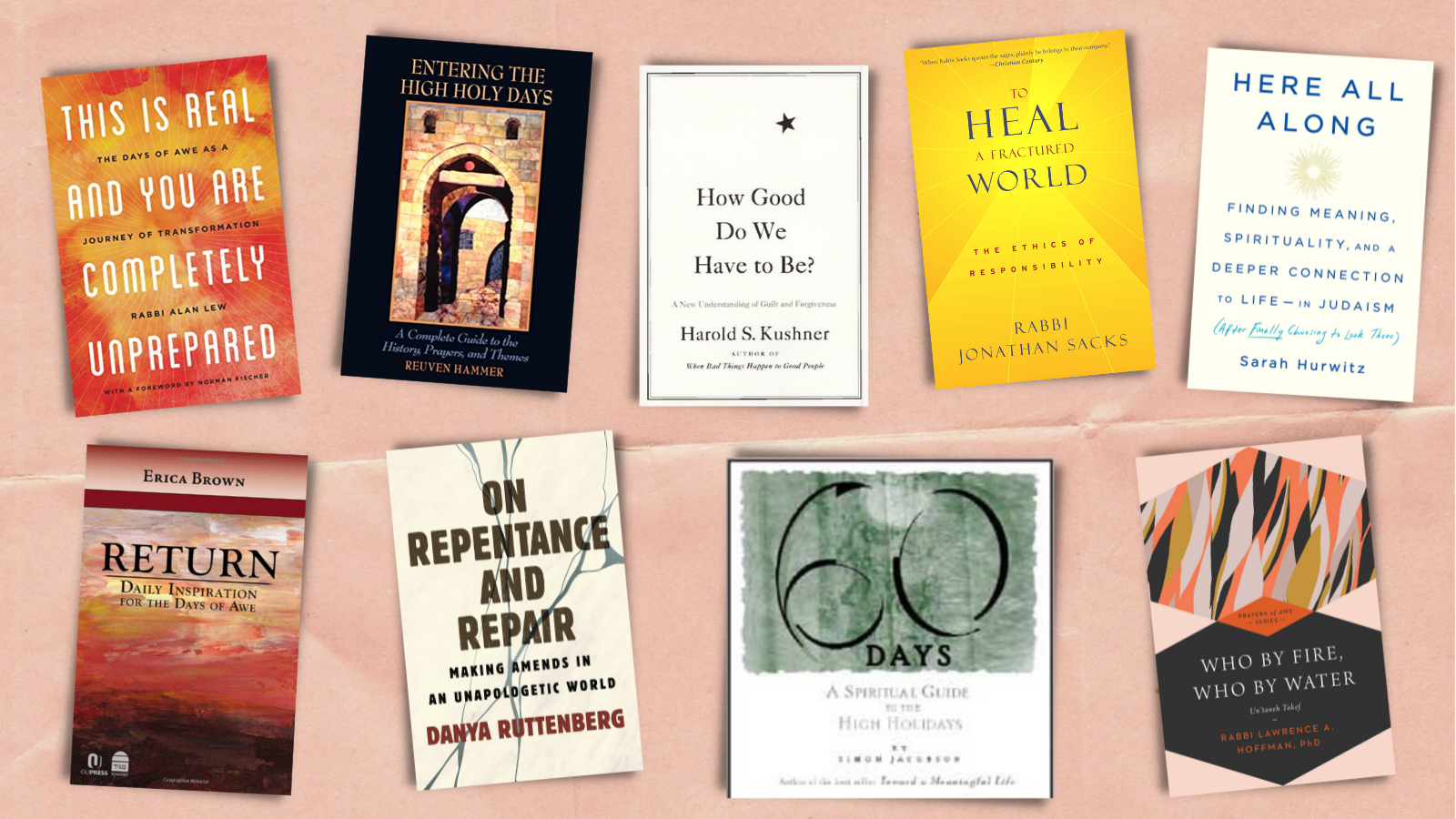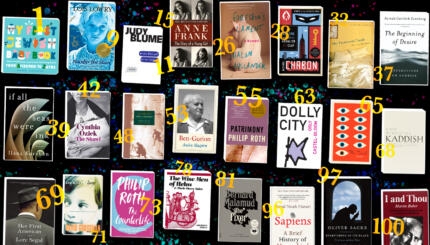The High Holidays certainly include practical preparations: Did you secure tickets for services at the synagogue of your choice? What are you cooking for Rosh Hashanah dinner? Did you set an alarm on your phone for the week before Yom Kippur so you can remember to start drinking more water ahead of the fast?
Jewish tradition encourages us to use the month leading up to Rosh Hashanah to prepare spiritually as well. During the Jewish month of Elul, many synagogues blow the shofar each day as a reminder that Rosh Hashanah and Yom Kippur are fast approaching, and it is also customary to recite Psalm 27 daily. Special services, called Selichot, also pave the way for the spiritual work of the High Holidays.
Are you more of a book person? Here are nine books that can be both a companion and a guide through the month of Elul and the High Holiday season.
1. This Is Real and You Are Completely Unprepared
By Rabbi Alan Lew
With your help, My Jewish Learning can provide endless opportunities for learning, connection and discovery.
Organized chronologically, beginning with a spiritual exploration of Tisha B’Av, followed by Elul, Selichot, Rosh Hashanah, the Ten Days of Awe and Yom Kippur, Rabbi Alan Lew’s insightful writing reflects his belief in meditation and mindfulness as useful Jewish spiritual practices. Even if you don’t identify as the “spiritual type,” Lew’s incorporates plenty of intergenerational rabbinic wisdom, historical anecdotes and passages from Judaism’s sacred texts that anyone can draw meaning from.
2. Entering the High Holy Days: A Complete Guide to the History, Prayers, and Themes
By Rabbi Reuven Hammer
Both Rosh Hashanah and Yom Kippur include special liturgy and rituals that are unique to the High Holidays and consequently unfamiliar to many Jews. In his introduction, Rabbi Reuven Hammer explains that using the weeks before Rosh Hashanah to “read the individual prayers slowly and carefully, to learn what they are saying and how they are put together” is key to experiencing the High Holidays in a more meaningful way.
The book is straightforward and comprehensive in mixing contemporary interpretations of the liturgy with biblical origins and historical developments. Whether you’re preparing for your first Rosh Hashanah or your 50th, you’ll surely learn something new.
3. Prayers of Awe
Nine-book series edited by Rabbi Lawrence Hoffman
“Prayers of Awe” is the name of a nine-part series, rather than a single book. Each book focuses on a specific theme or prayer relevant to the High Holidays. Individual titles range from All These Vows: Kol Nidre to All the World: Universalism, Particularism and the High Holy Days. Every book features a diverse selection of poems, reflections, essays and explorations penned by more than 40 different authors and rabbis — many of whom are considered top leaders in the world of Jewish thought today.
4. Return: Daily Inspiration for the Days of Awe
By Dr. Erica Brown
While Elul offers a month to train yourself to be ready for what’s ahead, the Days of Awe — the name given to the 10 days between Rosh Hashanah and Yom Kippur — are more like the actual marathon during which your endurance and training are truly tested. Dr. Erica Brown includes one chapter for each day during this period and ties in biblical or rabbinic teachings alongside practical exercises for reflection to implement each day.
5. Here All Along: Finding Meaning, Spirituality, and a Deeper Connection to Life–in Judaism (After Finally Choosing to Look There)
By Sarah Hurwitz
Sarah Hurwitz only attended synagogue on Rosh Hashanah and Yom Kippur, until she saw an intro-to-Judaism class advertisement after a bad breakup. Described by contemporary Jewish author Dara Horn as a “why-to guide” rather than a “how-to guide,” Hurwitz compiled the most profound moments of her own Jewish journey of discovery into this book. If your Jewish new year resolution is to dig deeper into your Jewish identity and heritage, there’s no better time to read Here All Along.
6. To Heal a Fractured World: The Ethics of Responsibility
By Rabbi Jonathan Sacks
This book was not written specifically for the High Holidays, but Rabbi Jonathan Sacks’ exploration of our individual obligations to ourselves, our loved ones, our communities and all of humankind is bound to resonate for those who are setting goals for the upcoming year and repenting for past wrongdoings. Offering inspiration from a plethora of Jewish texts, To Heal a Fractured World imparts wisdom that can be carried well beyond the Yom Kippur break fast.
7. On Repentance And Repair: Making Amends in an Unapologetic World
By Rabbi Danya Ruttenberg
In addition to authoring seven previous books, Rabbi Danya Ruttenberg regularly tweets nuggets of Jewish wisdom to her 160k+Twitter followers. In On Repentance and Repair, Ruttenberg goes back 1,000 years to the Mishneh Torah, the Jewish law code that includes Maimonides’ detailed explanations for repenting, and helps the reader understand how Maimonides’ lessons remain more relevant than ever.
8. 60 Days: A Spiritual Guide to the High Holidays
By Rabbi Simon Jacobson
The title “60 Days” refers to the two months, Elul and Tishrei (the month that contains the holidays of Rosh Hashanah, Yom Kippur, Sukkot and Simchat Torah), for which this book offers spiritual guidance. Unlike the other titles on this list, “60 Days” is spiral-bound and structured as a daily workbook for those two months. Each day includes a few readings, followed by thought exercises, writing prompts and ample space to catalog your journey through the end of Tishrei (about a week after the end of Sukkot).
9. How Good Do We Have to Be? A New Understanding of Guilt and Forgiveness
By Rabbi Harold Kushner
One of Yom Kippur’s most famous prayers, the Viddui, is an A-to-Z sampling of misdeeds. Leaning into confessing and atoning can certainly be rewarding, but it can also riddle us with guilt over ways in which we hurt others or made the wrong choices. Enter Rabbi Harold Kushner’s book. Kushner begins by reframing the famous story of Adam and Eve’s disobedience as essential to their humanity and humanity as we know it today. How Good Do We Have To Be? offers a warm hand to hold as you go on the seasonal journey of acceptance, forgiveness and radical self-compassion.
Disclosure: This post contains affiliate links, which means we may receive a commission if you click a link and purchase something that we have linked to. While clicking these links won’t cost you any extra money, they will help us keep this site up and running. Thank you!



